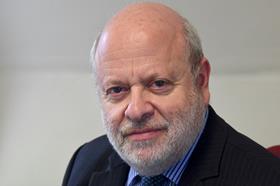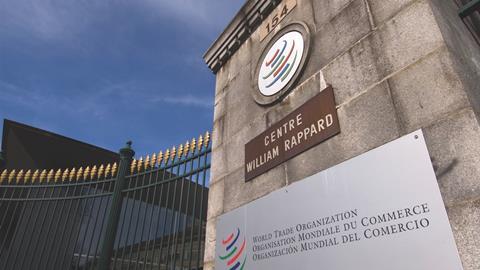
Now that the COP26 climate change conference is over, work had been gearing up for the next major international meeting, which would have started later this week, with consequences for lawyers. But, just three days before it was due to kick off, the new pandemic’s latest developments led to its last minute postponement. Nevertheless, it is worth understanding what would have happened, since the meeting will eventually take place in happier times.
The 12th Ministerial Conference (MC12) of the World Trade Organisation (WTO) was scheduled to take place from 30 November to 3 December 2021 in Geneva. Trade ministers from around the world – the WTO counts 164 member countries – would have met to review the functioning of the multilateral trading system, which has delivered considerable benefits to our profession as an exporter of legal services. This would have been the first such meeting where the UK would have appeared on its own, no longer under the EU umbrella.
As with COP26, there had been huge work to ensure that agreements could be signed during the few days of the conference. Probably the most high profile example is the work of the Council for Trade-Related Aspects of Intellectual Property Rights (TRIPS) to find a common intellectual property (IP) response to COVID-19. The shared goal is to provide timely and secure access to high-quality, affordable vaccines for all, rich and poor - but disagreement remains as to whether a waiver of IP rights is the best way forward.
That is of high interest to IP lawyers of course, but there are other areas of more general interest. Every topic is dense with the most obscure jargon and impenetrable technical terms (witness the many acronyms in this article), but are worth following, despite the postponement, for their potential impact on our work.
The issue which is of most consequence for solicitors goes under the heading of ‘domestic regulation’. This covers qualification requirements, technical standards and licensing requirements in services, and targets the kinds of barriers that solicitors face when we want to practise cross-border (how to obtain recognition of our existing qualification, for instance, or how to qualify in a new jurisdiction). The aim is to counter the unintended trade-restrictive effects of existing measures, and to provide predictability and transparency in the future.
This discussion has been subject to classic WTO politics. Work was continuing on domestic regulation on a multilateral basis (covering everyone), but at the previous WTO Ministerial Meeting in 2017, India and several other developing countries voiced opposition to the scope. This led to a large group of countries splitting off from the multilateral discussions to seek progress on a plurilateral basis, covering just those countries interested in making progress. Not surprisingly, India and its allies do not like plurilateral negotiations, because they are deprived of leverage.
Given the increasing difficulty of finding multilateral agreement among countries with such different agendas and types of economy, there are now various plurilateral negotiations, known as Joint Statement Initiatives (JSI), covering e-commerce, investment facilitation for development, micro, small, and medium-sized enterprises (MSMEs), and services domestic regulation. The US joined the JSI on domestic regulation earlier this year, a sign of more WTO engagement from the new administration, and it now covers 64 countries, including the UK, EU and other important markets for solicitors.
The news is that the JSI on domestic regulation was making headway on finalising negotiations in time for MC12, had it not been postponed. Although much publicity will eventually focus on the discipline applying non-discrimination between men and women in authorisation procedures, there will doubtless be other successes in transparency of procedures.
There would also have been news on e-commerce. E-commerce is an area with its own JSI, and there would have been an announcement at MC12 to take stock of what progress has been made in e-invoicing, cybersecurity, customs duties on electronic transmissions, open internet access and paperless trading.
Lawyers’ organisations were planning to be present. For instance, the International Bar Association was to send a delegation. The kind of topics of interest to lawyers are not only the outcome on domestic regulation, but also market access commitments, digital trade - since legal services are increasingly delivered electronically across borders, which throws up new legal and regulatory problems - and whether there will be any movement on the frozen WTO appellate body, which is unable to function because the US is refusing to allow the appointment of another judge to it.
Even before the last minute news, the pandemic hung over the proceedings. Up to four could register per non-governmental organisation, but there was a ‘floating badge’, which meant that only one representative of each organisation would have been admitted to events. There would have been limitations everywhere, in an event which thrives on constant briefings and haggling.
MC12 also would have been chaired by a Kazakh delegate, because it was originally supposed to be held in Kazakhstan in June 2020, but postponed for health reasons.
As with COP26, the eventual proceedings will seem remote from our lives. But as with COP26, the outcomes will affect us, not only those solicitors who advise clients on trade matters, but also those firms which are engaged in the cross-border trade of legal services. However, for the time being, we have to wait.
Jonathan Goldsmith is Law Society Council member for EU and international matters and a former secretary general of the Council of Bars and Law Societies of Europe. All views expressed are personal and are not made in his capacity as a Law Society Council member, nor on behalf of the Law Society
































1 Reader's comment